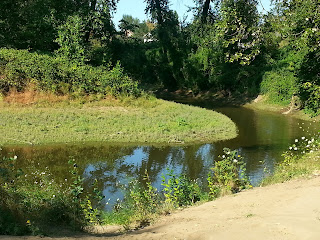Gardening has been a new experience this year. For one thing, there have been no aphids to speak of!
Very early, in May I think, I saw a few aphids on the broccoli plants and worried that it would be a very bad year for aphids if I saw them already in May. I looked up some organic remedies and made a concoction with garlic, hot pepper and a little dish soap. I sprayed once. The bugs went away. Not only the aphids, but also the worms that enjoy making the leaves of the chard look spidery, thin and not very attractive to eat. I thought the bugs went away due to the awesome spray I had made until I had breakfast with a friend who has been organic gardening for twenty or more years. He remarked that there were no aphids this year. Maybe it was too hot too fast for the aphids and other common pests to adapt. I will try to find out, but for now I will rejoice that I have had broccoli without aphids and chard that actually looks like something I want to eat for the last two months.
I have also had perfect tomatoes: no spots or blemishes of any kind, no irregular shapes, just perfectly red round tomatoes. Last year I read that it is best to eat tomatoes that have been preserved in glass jars since there is evidence that the coating on the inside of the cans may leech into the tomatoes - even those that are labeled as organic. In the past I used to buy a case or two of organic canned tomatoes in the fall that I would use over the winter months before tomatoes were in season again. I never bothered to can my own tomatoes since my garden produced just enough to eat fresh throughout the season. But this year, with all the sun and no bugs or tomato blight as I have had in the past, I have plenty of lovely tomatoes to can for winter use.
I always feel happy when I look at the jars of canned food cooling in the kitchen. It satisfies some primitive need to stock up for the winter but the tomatoes were so lovely to look at it was hard to cut them up and cook them down! Nonetheless, I have a four newly preserved quarts of tomatoes and a picture of my perfect tomatoes to remember them by.
The long unusually hot summer is beginning to wind down and my husband and I are starting to think about what we want to plant for the fall but the weather really has been so unusual this year that we are not sure how to plan for the next. It is important to continue working at producing our own local food and so we will. My husband continues to dry herbs for tinctures and is getting a new drying rack ready to try his hand at sun drying tomatoes. This year at least we will have an abundance since there was still enough water for the plants.

In the next day or two the forecast is calling for the first heavy rain since March, and that is very very odd for the Pacific Northwest. I am not unhappy as I am okay with rain and besides my vacation days are coming to an end and the grandchildren have started back to school as well. Maybe next year will be a little more normal or maybe this is the new normal. However it turns out I will remember this summer as a time of drought, smoke, fire -- and my first perfect tomatoes.











